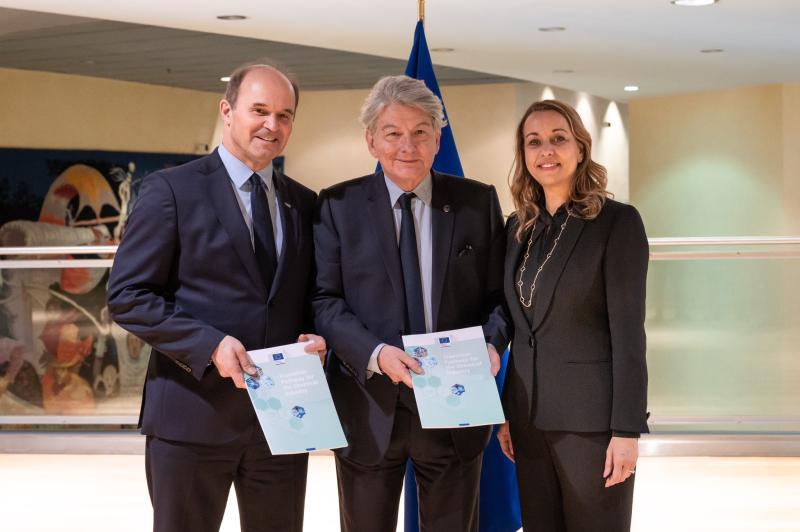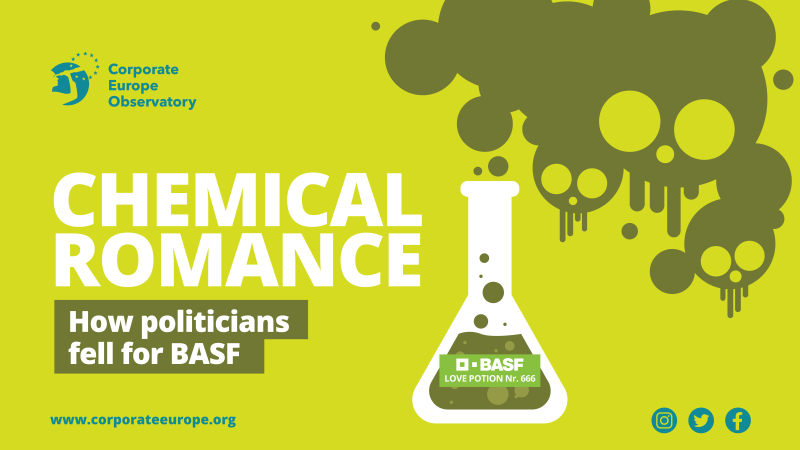
Chemical romance: how politicians fell for BASF
UPDATE 20 April:
On Thursday 27 April shareholders of BASF, one of Germany’s biggest corporations, will gather in Mannheim for its annual meeting. On the agenda at the BASF shareholders’ meeting will surely be BASF’s planned 2600 job losses, the reputational damage from its fossil fuel links with Russia, and its proposal to reward its shareholders with a massive €3 billion dividend. Critical counter-motions have been tabled, including by Dachverband der Kritischen Aktionärinnen und Aktionäre, to reject both the proposed shareholder dividend and the actions of the BASF Supervisory Board during 2022.
Meanwhile, since we published this profile, public concern about the legacy of PFAS or forever chemicals is growing, the ambition and timing of the European Commission’s reform of its flagship REACH chemical regulation remains unclear, and the EU lobby transparency register is investigating BASF’s EU lobby declaration following our complaint.
UPDATE 20 July:
The EU lobby transparency register has now replied to our complaint about BASF. BASF has apparently confirmed that it had not contracted Fourtold or Hanover in 2022, but it did have a contract with Ketchum. BASF apparently confirmed that the lobby costs it declared include the costs for in-house public affairs in EU27 countries.
The biggest chemical producer in the world, German company BASF is a political powerhouse and has used its influence to push back against chemicals regulation in the EU. No wonder, when its products include ‘forever’ chemicals and hazardous pesticides. Corporate Europe Observatory takes a look at the company's influencing tactics, as well as its scandals, from a massive carbon footprint to 'Cancer Alley'.
“We create chemistry” says the strapline of BASF, the biggest chemical producer in the world and an industrial behemoth in Germany. But these creations include toxic products including ‘forever’ chemicals, environmental pollution, and a huge carbon footprint due to its dependency on fossil fuels. The world is waking-up to how the human use of chemicals has crossed safe planetary boundaries, as these pollutants leach into our bodies, our soils, and our waters. Yet BASF continues to produce its toxic products for consumption both at home and abroad. And it is failing to substitute hazardous products with safe chemicals, while and demanding that the development of safer and more sustainable alternatives should be “incentivised”. Meanwhile its enormous political access and connections cross party lines and stretch ‒ via Berlin ‒ from the regional to EU level. Its multi-million euro lobby budgets, use of multiple lobbies-for-hire, and its active network of industry allies have helped ensure that EU regulatory reform, including on the much-needed and now much-delayed revision of the REACH SidenoteREACH – the EU’s flagship chemicals regulation from 2007 – is the registration, evaluation, authorisation and restriction of chemicals. It aims to improve the protection of human health and the environment through the better and earlier identification of the intrinsic properties of chemical substances. https://ec.europa.eu/environment/chemicals/reach/reach_en.htm regulation of chemicals, is as slow as possible. When effective regulation to better protect our health and environment is delayed, we and subsequent generations suffer.
Chemical disorder
Originally formed in 1865 as the Badische Anilin und Soda Fabrik (the Baden Aniline and Soda Factory), and still based in Ludwigshafen in the German region of Rhineland-Palatinate, the BASF group is made up of 248 companies, with BASF SE at the helm. With interests in chemicals, agrochemical products, biotech, plastics, and of course energy, it employs 110,500 people and operates across 91 countries. Crucial to BASF’s operations and its corporate identity is the Ludwigshafen Verbund, its huge integrated production and manufacturing site, which is also the world’s biggest chemical complex. Major shareholders in BASF include institutional investors such as BlackRock, the world’s largest asset manager, notorious for its investments in fossil fuels and deforestation, and Goldman Sachs.
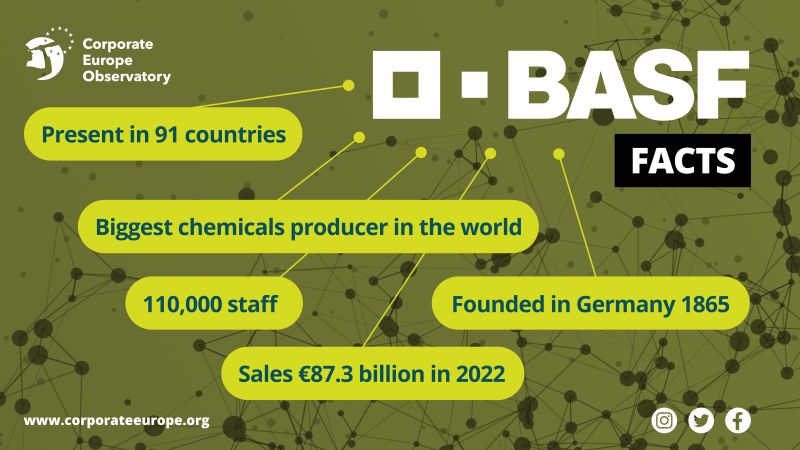
BASF may be the biggest chemical producer in the world, but it is far from the best-performing on environmental grounds. In 2022, Swedish NGO ChemSec reported that BASF was producing more hazardous chemicals than before. According to ChemSec’s SIN (substitute it now) list, BASF produces 25 “persistent” substances, 11 of which are PFAS or ‘forever’ chemicals SidenoteAccording to the European Chemicals Agency, per- and polyfluoroalkyl substances (PFAS) are a large class of thousands of synthetic chemicals that are used throughout society. They contain carbon-fluorine bonds, which are one of the strongest chemical bonds in organic chemistry. This means that they resist degradation. https://echa.europa.eu/hot-topics/perfluoroalkyl-chemicals-pfas , and the company is criticised for not banning from its portfolio new products manufactured with substances of very high concern. In fact it has stopped publishing “phase-out plans” for hazardous chemicals from their portfolio, signalling a “weakening commitment”. ChemSec also reports that BASF has safer alternatives within its products but does not properly market them to downstream users. These are just some of the reasons why ChemSec gave BASF only a “C minus rating” in its annual survey on if and how the chemical industry is working to reduce its chemical footprint.
This poor score comes in the context of BASF’s 2022 share buy-back scheme which cost €1.3 billion. As ChemSec rightly points out, these “elaborate financial games” to use cash to buy their own shares to boost the company’s short-term stock price are especially galling when BASF and the wider chemicals industry is simultaneously demanding public funding for the industry’s transition away from toxic products.
Alongside the German car industry, the German chemicals sector, which alongside BASF also includes Bayer, Henkel, Evonik, Covestro, Merck, and Lanxess among others, exerts exude huge political influence both in Berlin and Brussels. As mapped in the 2020 report ‘Tainted love’ by Corporate Europe Observatory and LobbyControl, Germany’s export-led economy privileges the biggest multinationals based in the country and in 2021 it exported €121 billion worth of chemicals beyond the EU, more than any other EU country.
In 2021 BASF experienced “record” sales of around €78.6 billion, benefiting from a post-lockdown boom. However 2022 has been more challenging as raw material and energy costs have soared following the Russian invasion of Ukraine, and BASF recently announced proposals for 2600 job cuts. Nonetheless, its higher production costs have been somewhat offset by charging higher prices to customers so that, according to its 2022 results, “BASF’s business proved robust” with sales up 11 per cent in value to €87.3 billion and 2022 shareholder dividends promised to mirror those of 2021 at €3 billion. BASF is also making a €10 billion investment in a new Verbund site in Zhanjiang, where costs are lower. China is its second biggest market. These and other investments in new and existing businesses means that the corporation’s investment in “net-zero transformation” looks small in comparison at only €400 million per year.
Despite its continuing economic heft, BASF and its industry allies (mapped below) have been running a war of words to water down the EU’s Green Deal. According to BASF’s Chief Executive and Chairman of the Board of Executive Directors Martin Brudermüller, the Green Deal will “unleash a flood of regulations on the chemicals industry, placing an additional burden on us”. They aim to shift debate away from the pressing health and environmental need to better regulate chemicals – and tackle their social and ecological costs – towards protecting their financial interests, a campaign which has been given new impetus as energy and raw materials have become more expensive.
REACH-ing out for political influence
It’s true that a number of new EU regulations are in the pipeline for the chemicals industry, as part of the European Green Deal and its component the Chemicals Strategy for Sustainability. PFAS (also known as ‘forever’ chemicals) are the subject of a targetted initiative at the EU level, while other hazardous chemicals should become subject to tougher regulation under a revision of the REACH (Registration, Evaluation, Authorisation and Restriction of Chemicals) and CLP (Classification, Labelling and Packaging of chemicals) regulations.
But it’s also true that these new regulations aim at drastically improving the regulation of toxic chemicals – and that BASF has a long track record in leading the fight against progressive chemicals regulation. The lobby battle over the original REACH regulation (1998-2006) remains one of the most contentious in EU history and according to Corporate Europe Observatory in 2005, “BASF is probably the one European company that has most aggressively fought against REACH … this is in stark and provoking contradiction with its self-proclaimed commitment to sustainability.” BASF and its allies were on the wrong side of history when they opposed REACH and scaremongering that the proposals would “de-industrialise Europe”, mobilising industry allies, placing BASF experts directly in relevant political departments, and lobbying were all part of the influencing toolbox at the time.
Meanwhile for over a decade the EU has failed to regulate endocrine disrupting chemicals (EDCs) which are suspected to have severe health costs (estimated at over €150 billion annually) and long-lasting environmental impacts. BASF, Bayer, and their trade associations, together with allies in various member states, actors within the Commission, and in the European Parliament have managed to put action entirely on the back-burner. Now the hope for EDC regulation is the revised CLP: watch this space.
Today BASF’s approach has not really changed. While the company says it supports the EU’s proposed chemical reforms, its lobbying messages are far more self-interested, such as urging the EU to push for reform at a global level, a sure-fire way of kicking meaningful change into the long grass. And its public statements seem designed to scare politicians from doing the right thing. These comments include that the EU’s “enormous number of planned regulations” in the area of chemicals have contributed to BASF’s decision to “cut costs across its European operations”. Or BASF’s Chief Executive Martin Brudermüller saying that the EU’s proposed chemicals regulatory reform “puts a big question mark over the future of chemicals in Europe”. And that BASF will have to downsize “permanently” in Europe, with high energy costs making the region increasingly uncompetitive. Then decision-makers in Berlin and in Brussels pay attention.
Notably the German chemical industry has won a significant recent victory, namely a delay to the publication of the European Commission’s proposed REACH revision (this is discussed in more detail below). This delay represents much, much more than a minor bureaucratic blip. Every month of delay allows toxic products, including those sold by BASF, to remain on the EU market. And the delays are frustrating not just for environmental and health campaigners, but for other parts of industry including those who use chemicals in their supply chains and who have been demanding an “ambitious revision of REACH as soon as possible”.
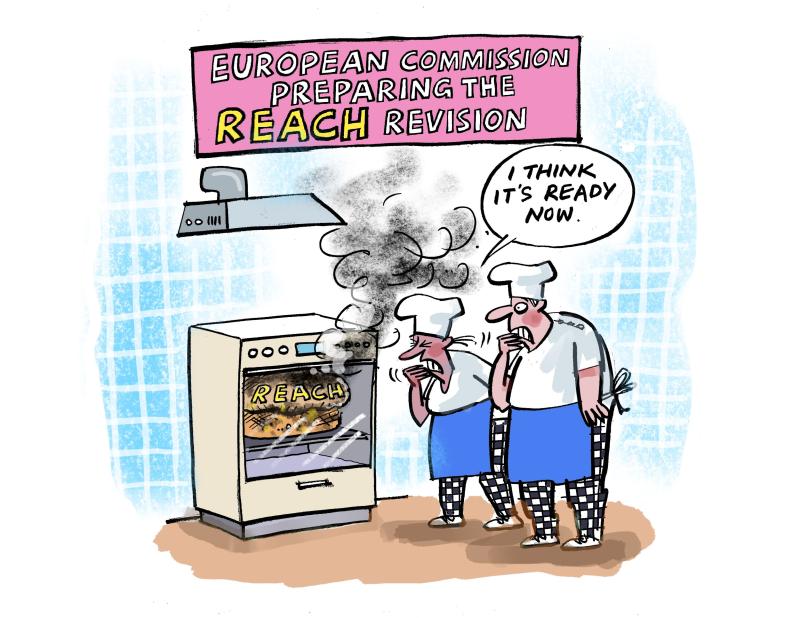
The risk is that something similar happens with the proposed ban on PFAS. In late February 2023 Tagesschau reported that BASF is among several German chemical and plastic lobbies pushing to undermine the plan to ban whole classes of PFAS chemicals. Industry is pushing for checks on individual substances instead, which will be far less effective and will take much more time, time that we do not have as these ‘forever chemicals’ are persistent and do not break down in the environment.
BASF’s sheer economic weight almost guarantees political access to further its goals, reinforced with wider political connections and huge lobby budgets, networks of industry allies, and seats at the table: that is a recipe for success. Below we explore BASF’s key influencing tactics (part 1) as well as some of the biggest scandals and controversies that have dogged the company in recent years (part 2).
Part 1 – BASF’s key influencing tactics
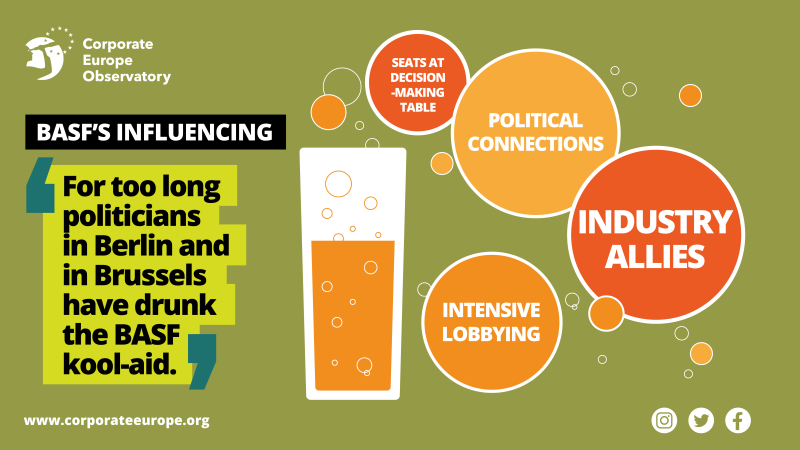
1. Super-charged political chemistry
Chancellor Angela Merkel. The Minister-President of the state of Rhineland-Palatinate. The premiere of a specially-composed orchestral symphony. 1000 guests. That was BASF’s 150th birthday celebration held in 2015, a symbol of the corporation’s political heft.
Key to BASF’s political influence is its excellent political access and wider connections, which extend across political divides and across levels of government. And crucially these appear to deliver.
As a major employer in the Rhineland-Palatinate region of Germany, BASF holds annual talks with the state government to put forward its interests. In May 2022 following a meeting with BASF’s board of executive directors, the state government reported that it was “strongly lobbying” the federal government to support “the interests of Rhineland-Palatinate’s economy”, with the state minister of economic affairs championing “close and trusting exchanges between business and politics”.
Malu Dreyer, the SPD (centre-left party) Minister-President of the Rhineland-Palatinate region, has made regular visits to BASF sites, locally in Ludwigshafen and further afield in Belgium including to two controversial projects: a new liquefied natural gas (LNG) terminal and a joint venture with Air Liquide to produce hydrogen at BASF’s Antwerp Verbund. Other politicians, including then SPD Finance Minister Olaf Scholz have also made similar visits. Meanwhile, the impeccably well-connected BASF Chief Executive, Martin Brudermüller, was part of the industry delegation accompanying now-Chancellor Olaf Scholz to Beijing in November 2022, repeating a trip he made with Chancellor Merkel in 2018.
In Autumn 2021 the chemicals industry won a significant political victory in Germany with a full paragraph included in the agreement that brought together the coalition partners (SDP, FDP (Liberals), and the Greens) in Scholz’ new federal government. The text promised to “strengthen [the chemical industry’s] competitiveness and innovative strength” as well as “Germany as a production location”. Separately the agreement promoted the controversial “chemical recycling" SidenoteChemical recycling aims to convert chemical waste by changing its structure and turning it back into substances that can be used as raw materials in plastics or other products. However, the risks of contamination in the reformed products are high and it requires very intensive energy inputs. It’s used as an argument by the industry to justify continuing to produce toxic chemicals. https://zerowasteeurope.eu/2021/01/chemical-recycling-underwhelming-oversold/ in what was a clear win for the industry and likely the pro-business FDP.
And in January 2023, following talks with the industry including senior BASF executives, Scholz announced “a very special format where we talk about the future of the chemical industry”. According to Süddeutsche Zeitung Malu Dreyer, who was also present at the meeting said “it is a matter of developing new forms of cooperation between politics and industry and joint approaches to solutions”, including to achieve carbon neutrality.
It seems clear that the demands of the chemicals industry are centre-stage in the thinking of many politicians in Germany. But the political connections go deeper still. In 2005, Stern reported BASF saying that it was aware of 235 political mandates held by its employees. These included the then-FDP Vice-President of the Rhineland-Palatinate state parliament who was also a BASF accountant on the payroll. The employee denied any conflicts of interest, saying that if someone senior at BASF had a political concern, they would “go directly” to Gerhard Schröder, then-German Chancellor and that BASF “doesn’t need me for that”.
Much more recently, Süddeutsche Zeitung reported that Brudermüller was nominated by the CDU (centre-right) party as a member of the Federal Assembly, along with parliamentary group leader Christian Baldauf and other MPs, to elect the President of Germany in 2022.
More surprisingly, BASF has been courted by the German Greens too. In 2019 Frankfurter Allgemeine Sonntagszeitung reported that Brudermüller was joining the economic policy advisory board of the German Greens, lauded as a “role model for other managers” by then MP Kerstin Andreae (who now heads up the BDEW, the German association for water and energy industries). The Economist has reported that this formed part of the Greens’ strategy to “redefine themselves as allies rather than adversaries of German business” in the run up to joining the current coalition government.
"Few individual corporations are as influential in Germany as BASF. The company enjoys privileged access to the highest decision-makers, holds leadership roles in the most powerful German lobbying associations, and has enormous economic power including threat potential. When Brudermüller speaks, politicians listen - even the Greens." Nina Katzemich, LobbyControl
Taken in the round, this certainly looks like special access for BASF and other big chemical players at the very highest levels of German politics, with close ties to a wide range of political parties seen as a win-win for all concerned. But the full extent of access in Berlin, including lobby meetings, for now, remains secret. The Chancellery has refused to provide any data about its contacts with BASF when asked by Corporate Europe Observatory via freedom of information requests.
However according to a LobbyControl analysis of access by the gas industry lobby, BASF a major gas consumer (see below) had at least 35 meetings with German federal government officials in the December 2021-September 2022 period, making it one of the most frequent visitors from the gas lobby to Berlin’s corridors of power.
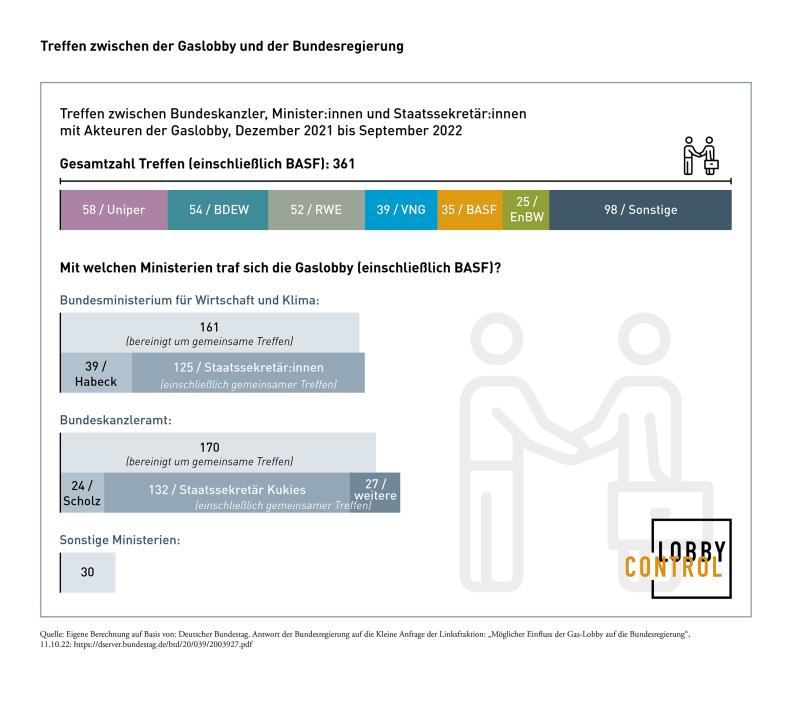
Credit: blickpunkt-x.de
Chemical reaction: Political influence over REACH delay
It is notable how the COVID-19 pandemic and the Russian invasion of Ukraine have been instrumentalised by centre-right politicians in Brussels and in member states, especially Germany, to demand postponement or even dumping of proposals for new environmental regulations, including those in the flagship European Green Deal eg REACH and the Farm to Fork strategy.
In April 2022 the German centre-right parties (CDU and CSU) included the REACH revision in a list of EU environmental and social proposals which they said should be put on hold, using the Ukraine war as a pretext. A Dutch Vice-President of the European Parliament’s EPP group proposed to Commission President von der Leyen a “legislative embargo” on new regulations which are “burdening” business, specifically mentioning REACH. Most recently, a prominent German EPP MEP demanded “no new #REACH” at all.
Federal MPs have also raised concerns: Alexander Engelhard (CDU-CSU) asked the federal government if there were any efforts to partially or fully suspend the European Green Deal. The government denied this, and indeed the 2021 coalition agreement promises action on ‘forever chemicals’ (PFAS), endocrine disruptors (EDCs), and on REACH reform, but the lobby pressure has certainly been there.
The REACH reform proposal was listed in the Commission’s work programme for 2023, but delayed to the last quarter of this year. Revising the EU’s flagship chemicals regulation is long overdue but with little over a year left before European Parliament elections, time is running out for MEPs and member states to come to initial positions on any proposed reform.
BASF’s warning that the EU must ensure any rule changes do not “damage industrial production” has clearly been ringing in politicians’ ears. Pressure may have come from Berlin for a delay on the REACH revision, but fingers were also pointed at the German President of the Commission Ursula von der Leyen and her inner team for the final decision. A media report stated that von der Leyen announced the postponement of the REACH reform in the group of MEPs from the CDU and CSU.
Perhaps a good signifier of the Commission’s high level commitment to the chemicals industry was a recent round table event on the implementation of the EU’s chemicals strategy. The co-lead for REACH reform, Industry Commissioner Thierry Breton, not known as a huge fan of the reform, spoke at this Commission event, and gave the floor to Brudermüller to speak on behalf of industry, and then left before hearing any other contributions, including from civil society.
2. Lobby giant
According to LobbyFacts, BASF SE is one of the biggest corporate actors in Brussels. It is the 12th highest lobby spender among companies, declaring between €29.6 million and €31.1 million in the 2011-21 period, and a €3-€3.5 million spend for 2021.
BASF clearly puts a lot of emphasis on the face to face lobbying of EU politicians. It has more European Parliament access passes (19) than any other company in the EU register. Not all MEPs publish lists of their lobby meetings, but of those that do, according to IntegrityWatch, since July 2019 33 MEPs have reported a total of 53 meetings with BASF lobbyists on various topics. This includes a total of 15 meetings reported by 6 German MEPs from the EPP group.
Even the pandemic did not stop one of Europe’s biggest pesticide producers schmoozing with selected MEPs being sent a “wine tasting kit” in order to participate in two video conference sessions with BASF’s in-house sommelier. The free wine came with the opportunity to discuss “how the Farm to Fork Strategy could bring new opportunities & challenges for wine producers and farmers”.
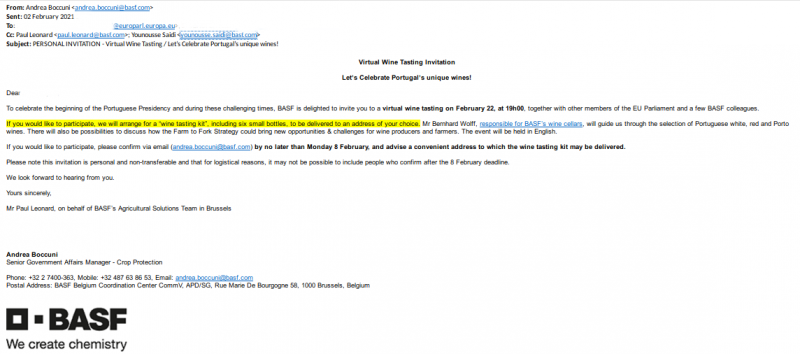
According to LobbyFacts, BASF has had 43 high-level meetings with the EU Commission since December 2014. While it is not one of the most frequent visitors to the Berlaymont, it has had meetings with 11 different commissioners, and that 1 meeting in July 2020 involved no less than 9 members of the von der Leyen Cabinet, its access is not inconsiderable, especially when factoring in additional access via trade associations such as CEFIC, VCI, and CropLife (see below).
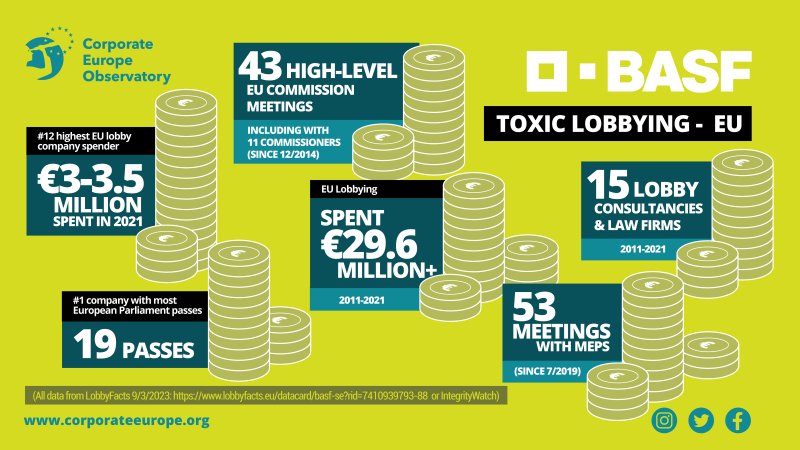
But far more ‘impressive’ are the 15 lobby consultancies and law firms working for BASF or its subsidiaries in the 2011-21 period including Burson Cohn & Wolfe (formerly known as Burson-Marsteller), Edelman, EPPA, FTI Consulting, among others. It is a weakness of the EU lobby transparency register that we know next to nothing about the work performed on behalf of BASF by these intermediaries. Curiously BASF does not currently declare any intermediaries, yet Fourtold and Hanover Communications declare it as a client. Registrants should declare all intermediaries and under the EU lobby register’s ‘single entry rule’ group all subsidiaries should be grouped under one entry. Earlier this week Corporate Europe Observatory complained to the EU lobby register secretariat about this apparent oversight. (UPDATE 31/3/2023: The EU lobby register secretariat has now confirmed that it will investigate our complaint.)
In Germany, BASF is also prolific with 6 entities registered, declaring between €3.85 million and €3.9 million aggregated national lobby costs in 2021. BASF SE itself declares 24 lobbyists and no less than 84 memberships of other lobby organisations including the powerful German car lobby (the VDA). In France, perhaps not surprisingly, the sums are less, but not insubstantial with €200,000-€300,000 declared in 2021. And in the US in 2021, BASF SE declared spending US$1.68 million according to OpenSecrets. In 2022 the figure was US$740,000.
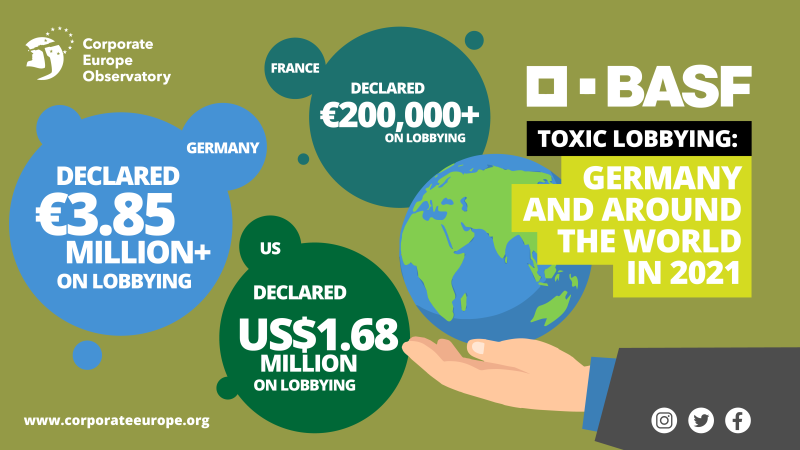
3. Outsourced lobbying
It’s impossible to talk about BASF’s political influence, especially in Brussels, without talking about the role it plays as members of many other powerful industry associations such as CEFIC, VCI, CropLife, BusinessEurope, and the ERT, as outlined below.
CEFIC: the European Chemical Industry Council is the highest lobby spender in Brussels, according to its own declarations in the EU lobby register, and has held that position for several years with a 2022 lobby spend of €10.4 million. CEFIC says it is “the voice of the chemical industry in Europe” and that it represents large, medium, and small companies across Europe. Handily its President is BASF’s Martin Brudermüller, which gives him an extra platform with the most senior of EU decision-makers, such as when the Director-General of the Commission’s DG Grow, Kerstin Jorna, attended a CEFIC board meeting in May 2022. In total, CEFIC has enjoyed 149 high-level meetings with the Commission since December 2014.
One of CEFIC’s big interventions in recent chemicals debates has been to commission its own impact assessment of the Commission’s overall programme for chemicals legislation reform, and specifically into the proposed extension of the Generic Risk Approach (GRA) to ban the most harmful chemicals in consumer products and create new hazard classes. The Commission must produce an impact assessment on all of its own legislative proposals before they can progress; a trade association commissioning its own assessment would aim to ensure that industry’s economic interests influence the final file. And so it was in this case: CEFIC’s assessment predicted that up to 12,000 substances could be in scope, covering up to 43 per cent of the European chemical industry’s total turnover. This has been adopted seemingly as gospel by the industry and has provided grist to the campaign mill of conservative MEPs to indefinitely postpone REACH. However the Commission has written that the “assumptions taken in the CEFIC study go well beyond what we are planning”.

VCI: the Verband der Chemischen Industrie or chemical industry association is CEFIC’s German counterpart, and its big member companies make the German sector as a whole notoriously conservative in approach. BASF’s Brudermüller is a VCI Vice-President. Another major lobby player, VCI declares spending at least €8.23 million on lobbying in Germany in 2021 and declares a huge 65 individual lobbyists. If you add in the declarations of regional VCI chapters, the total declared spend grows to at least €8.5 million in Germany. VCI is also very active at the EU level; according to LobbyFacts it has a declared spend of €4.5-€5 million in 2022 and an overall declaration of over €32 million in the 2015-22 period. If CEFIC is the highest spending trade association in Brussels, VCI is the fourth highest, showing the lobby power of the chemicals industry.
The VCI is politically active: Lobbypedia calls it one of the “largest party donors” in totalling €5.4 million in donations between 2000-19 to the CDU, CSU, FDP, SPD, and even the Greens. In 2020-21 it spent nearly a quarter of a million more on donations.
VCI has been among the loudest voices on REACH pleading with German and EU policy-makers to stop “slowing us down with ever new, unaffordable requirements”. In September 2022, a VCI briefing called for the postponement of legislative proposals that “place an additional burden on competitiveness” such as the implementation of the EU chemicals strategy. In January 2023 VCI argued that the safe and sustainable use of chemicals can “already be achieved within the existing REACH framework”. Freedom of information requests have shown that the Deputy Director-General of DG-GROW Kristin Schreiber attended a meeting of the VCI political committee in June 2022 to discuss REACH reform among other topics. It seemingly manages to keep friendly relations with Commission officials, even going so far as inviting a Cabinet member of Commissioner Šefčovič to join an out-of-hours football team, amongst the lobbying.
BDI: the Bundesverband der Deutschen Industrie, the Federation of German Industries, is another lobby heavyweight, with a declared EU lobby budget of more than €3 million, and €7.48 million declared in Germany. BASF’s Brudermüller is a member of the group’s Presidium and it is active on chemicals, among many other issues. Chemicals regulatory reform was discussed at a ‘virtual’ breakfast between DG Grow’s Kerstin Jorna and the BDI executive, and at several meetings with the cabinet of EU Environment Commissioner Sinkevičius. In Brussels, BASF, VCI, and BDI all share the same office address on Rue Marie de Bourgogne, in the heart of the EU quarter.
BusinessEurope: perhaps Brussels’ most influential lobbyist, BusinessEurope is the parent of the BDI and employers’ associations across the EU. It declares lobby spending of €4-€4.5 million and includes BASF, Bayer, and Solvay among its corporate members. BusinessEurope was a key actor urging for the supposed ‘better regulation’ agenda at the EU level, which Corporate Europe Observatory has renamed “corporate friendly deregulation in disguise” and so there were no surprises when in July 2022 it said “there is the big question as to whether [the REACH revision] is necessary at this moment in time”.
ERT: the European Round Table for Industry enjoys regular access to chancellors and presidents, and has had 127 high-level meetings with the Commission since December 2014. The ERT is a lobby vehicle for the chief executives of some of Europe’s biggest companies to make demands on ‘big picture’ topics such as the beloved single market. BASF’s Chief Executive Brudermüller is chair of the ERT’s Committee for Competitiveness & Innovation, yet another platform from which to talk about BASF’s wider interests in “investing political capital in finally completing the Single Market and doubling down on investment in key infrastructures, R&D and innovation”.
As a reflection of the inter-play between these different lobby groups, and their high-level political access, a letter from Brudermüller (CEFIC President) to Commission President Ursula von der Leyen indicates “I very much value your interaction with the European Round Table for industrialists (ERT) and would value a further dialogue. I would therefore much appreciate to be able to meet you … following a series of meetings we have had on this topic with European Heads of State so far.”
CropLife Europe: this trade association represents the major pesticide producers including BASF, Bayer, Corteva, and Syngenta. Until July 2022, CropLife Europe was chaired by Livio Tedeschi, BASF Senior Vice President, and it is very active in the Brussels Bubble. In March 2022 Corporate Europe Observatory exposed CropLife’s strategy to publicly back the Farm to Fork intentions while in reality employing a wide variety of lobbying tactics to undermine ambitious, binding targets. This included producing its own ‘impact study’ to use as ammunition to undermine Farm to Fork, in a now-common industry tactic (see CEFIC above and ERIF below). A follow-up story by Investigate Europe further exposed the power of the pesticide lobby in Brussels. CropLife conferences also enable their members to hobnob with EU decision-makers.
ERIF: unlike the lobbies above, the European Regulation and Innovation Forum (previously known as the European Risk Forum, ERF) is a self-styled think tank backed by big polluters and until a few years ago also the tobacco industry. Its members include BASF, Dow Europe, Henkel, Syngenta, CEFIC, Plastics Europe, and VCI among others. ERIF is a big fan of the ‘better regulation’ agenda and played a major role in promoting the so-called ‘innovation principle’ which undermines the rationale for new regulation and stands in opposition to the precautionary principle which urges action to regulate risk. Advocates of ‘better regulation’ promote tools such as impact assessments as they can privilege economic arguments over social and environmental ones and there is no surprise that the chemical industry lobby is so prominent among ERIF’s members.
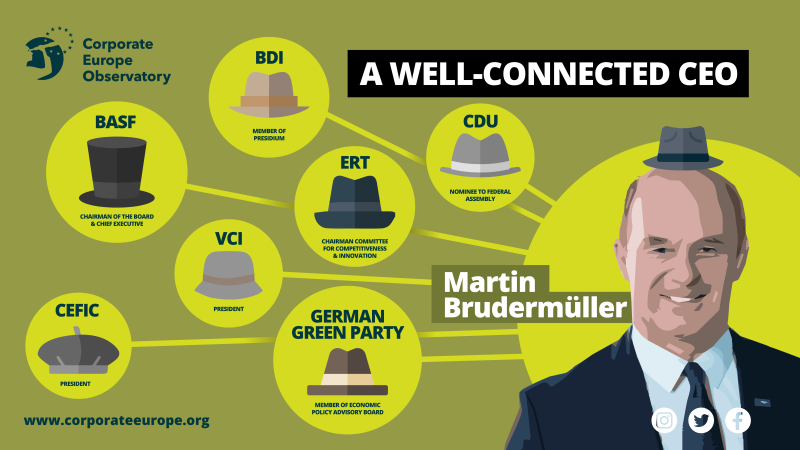
4. Seats at the table
Of course, if BASF can secure a seat at the decision-making table, direct lobbying becomes far less necessary.
In the original REACH battle of 1998-2006 revolving doors were very prominent, with staff moving smoothly between the chemicals industry and the Commission or vice versa. A 2006 Greenpeace International report cited the case of BASF EU Governmental Affairs Manager in 1998, who then joined the REACH Unit of DG Enterprise and Industry in the Commission in September 2001, and then moved to the German Ministry for Economic Affairs in 2004 to be in charge of REACH.
In 2015 Corporate Europe Observatory exposed how the pesticide committee of the BfR (the German Federal Risk Assessment Institute, which plays a key role in assessing the safety of chemicals such as pesticides) included two employees from BASF and one from Bayer among its members, even though their employers could benefit from the recommendations made.
And when it comes to standards committees across members states (these committees review and agree technical standards to develop consistency and uniformity in products and processes for manufacturers, consumers and regulators), BASF has many seats.
For example the German standards committee (DIN) delegates BASF to many different committees at the EU or international levels such as those from the European Committee for Standardisation (CEN) on plastics, packaging, fishing gear, and vehicles, as well as from the International Standards Organisation (ISO) on plastics and ‘chain of custody’. For BASF the ‘chain of custody’ committee is super important as it decides upon the characteristics of ‘mass balance’, a method BASF is calling for authorities to use in “recycled content” targets and labels. BASF is, controversially, keen to label as many plastic products as possible as “100% recycled”. In Sweden BASF also attends the 'chain of custody' committee of the Swedish standards committee (SIS) and is delegated by SIS to attend the mirror committee at the ISO. Likely this pattern is replicated in other member states.
So far this article has mapped the influencing tactics of BASF and its allies. Sure, BASF throws a lot of money and capacity at lobbying, but politicians and decision-makers are also willing to play ball, to entertain the lobbying and in too many cases, to act accordingly. BASF’s key allure is that it is a major employer and contributes to Germany’s export-led GDP. But that is far from the whole story and it is worrying that so many decision-makers have discussed, schmoozed with, and been influenced by, a corporation dogged by controversy and scandal. We map some of those stories below.
Part 2 – BASF’s biggest controversies and scandals
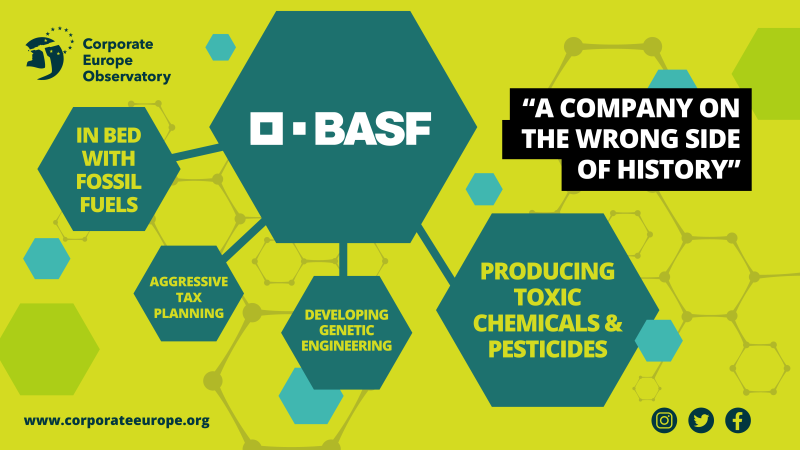
A. A ‘fine’ mess
According to the Chemscore 2022 report, BASF is producing 133 hazardous chemicals, a number which has increased. These include 25 “persistent” substances, 11 of which are PFAS or ‘forever’ chemicals. BASF was also rated 0 out of 6 in the “lack of controversies” category of Chemscore 2022 because of various accidents in the past decade, two of which led to “fatal outcomes for workers in their plants”. These controversies include incidents at BASF’s flagship Ludwigshafen site, while a 2019 report by BUND found that BASF was among a number of major chemical producers that had broken important aspects of the EU’s key chemical safety regulation REACH by not completing important safety checks.
However, if anything its safety record in the US is even more alarming. In December 2021 BASF had the largest footprint of cancer-causing air pollution of any foreign-owned company and the fourth-largest toxic footprint among all companies operating in the US, according to analysis by ProPublica. Gulliver, the Corpwatch data site, records a massive US$173 million worth of fines levied on the company (from the year 2000 to 29 September 2022) in the US, including 143 environment-related offences which clocked up over US$88 million in penalties. Violation Tracker maps these penalties in more detail. Some relate to ‘Cancer Alley’ a stretch of the Mississippi River in Louisiana where the population of mostly Black and poor people have been forced to breathe a “toxic soup” of chemicals from industrial smokestacks owned by BASF and other companies. All told, ProPublica estimated that BASF’s two dozen plants in the US elevate cancer risks for an estimated 1.5 million people.
B. Genetic modification
Biotechnology including genetically engineered products are a substantial and highly contentious part of the BASF portfolio.
Along with other big industry players, BASF is pushing to deregulate all new GMOs including products from controversial CRISPR-Cas genome engineering techniques SidenoteGene editing techniques such as CRISPR guide molecular scissors to the location on the genome where the DNA change is intended to take place. The products are known as new GMOs as this is a relatively new development that differs from the previous generation of GMOs. https://www.gmfreeze.org/why-freeze/new-gm-techniques/ in areas of seed, biotechnology and crop protection research. Meanwhile BASF has been applying for import authorisation for crops that are modified to be tolerant to herbicides, showing that their business model is not focused on reducing dependence on pesticides.
It’s remarkable that BASF has not learnt its lesson regarding the risks of GM considering the Bader Farms dicamba legal ruling in 2020. BASF and Bayer (which now owns herbicide-producer Monsanto) were ordered to pay millions when peach farmer Bill Bader complained about dicamba-based herbicides being sprayed on a neighbour’s GM-engineered cotton crop. Dicamba then drifted over to his farm, and killed his peach trees. This case and similar suits about the use of dicamba are still in the US courts today and it remains a contentious herbicide.
C. Selling toxic pesticides
Dicamba is far from the only risky agricultural product in the BASF portfolio. A 2020 study by Public Eye into the export of highly hazardous pesticides found that 5 big producers including BASF (alongside Bayer Crop Science, Corteva Agriscience, FMC, and Syngenta) are “champions in sales of the world’s most toxic and controversial pesticides”. Public Eye’s analysis showed that in 2018 nearly 25 per cent of BASF’s sales of its pesticide bestsellers were of substances that pose the highest levels of hazard to health or the environment, amounting to US$640 million. These include the insecticide Fipronil (toxic to honey bees and found to be at the heart of the 2017 Belgian and Dutch egg scandal) as reported in a 2021 Corporate Europe Observatory study.
A 2020 study by German and global south NGOs revealed that Bayer and BASF were selling pesticides in the global south which contain active ingredients that are not approved in the EU, including substances which are explicitly banned in the EU as they are especially hazardous to human health and the environment. The authors considered that such “double standards” of German multinationals endanger the health of farmworkers in South Africa and indigenous groups in Brazil.
D. In bed with fossil fuels
Chemical production requires huge amounts of energy, both as a feedstock in products and to power the manufacturing process. BASF’s Ludwigshafen Verbund alone consumes four per cent of Germany’s total gas consumption or more than that of the whole of Denmark. For decades BASF and other intensive energy users have worked to secure cheap and reliable supplies of fossil fuels, including via its subsidiary Wintershall Dea. This has helped lock Germany and the EU into Russian gas and, most recently, the alternative liquefied natural gas (LNG).
BASF first bought Wintershall in 1969 in order to help secure its supply of raw materials and today Wintershall Dea calls itself “the leading European independent gas and oil company” and it supplies a wide range of customers beyond BASF. BASF owns more than two-thirds of Wintershall Dea and, among other projects, it has had several ventures with Gazprom, the state-backed Russian energy giant. These include the highly controversial Nord Stream 1 gas pipeline from Russia to Europe which is currently shut-down, the inoperative Nord Stream 2 pipeline, and the Siberian gas exploitation project Achimgaz.
The “lucrative link-up” with Gazprom must have seemed like a good idea at the time, but the warning signals were always there; BASF chose not to see them. As far back as 2008, commentators speculated that deals with prominent European companies were part of Gazprom’s political strategy to develop its foothold in the EU. As Chris Weafer of the Russian UralSib Bank observed in the New York Times: “Gazprom is creating a lot of lobby groups in the form of its partners. Instead of Gazprom having to knock on the door of the European Parliament, Total and BASF will do it on their behalf.”
Today it seems that the Russian strategy of making Germany dependent on Russian natural gas supplies succeeded. BASF strongly opposed an energy embargo on Russia with Taz’s editor likening its Chief Executive Martin Brudermüller to “an arsonist who sets fire to the house first and then claims only he is able to extinguish it”. Meanwhile Tagsschau has reported on how Michael Thumann, an editor at Die Zeit, has sharply criticised the close ties between Gazprom, BASF, and Wintershall: “If you look at the way BASF and Wintershall have intertwined with Gazprom over the past 20, 30 years, you have to say: they have allowed themselves to be instrumentalised.”
For BASF and Wintershall Dea the strategy of getting into bed with Russian fossil fuels has put them on the wrong side of history. The Russian invasion of Ukraine prompted BASF to largely close down its business activities in Russia, including writing-off its investment in the Nord Stream 2 project. It has taken until January 2023 for Wintershall Dea to announce it will finally exit its Russian projects, and only then because of the “economic expropriation of its joint ventures” by the Russian state. Consequently Wintershall Dea reported a net loss in income of €4.8 billion in its 2022 financial results and BASF says that it wishes to sell its stake in the energy company.
But it’s not just Russian fossil fuels. As mentioned above, BASF is heavily invested in liquefied natural gas (including fracked gas from the US) and there are serious concerns that Germany is locking itself into fossil fuel LNG for decades to come.
BASF also produces and consumes a lot of carbon-intensive hydrogen. It has been awarded generous public funds (€134 million) to support production of so-called ‘green’ hydrogen, Sidenote‘Green hydrogen’ is made from renewable energy. but hyped demand for green hydrogen is problematic. It ends up supporting dirty hydrogen (during the supposed transition to ‘cleaner’ hydrogen) and represents a huge grab of clean energy, including from the global south, when that electricity could meet local development needs and climate targets instead.
No wonder that InfluenceMap placed BASF 3rd on its Climate Policy Footprint 2022 of the 25 most negative and influential companies blocking climate policy action globally. InfluenceMap critiques BASF’s “intense European-level policy engagement including widely supporting expanded oil and fossil gas production and infrastructure in Germany and internationally following the invasion of Ukraine”.
This is in keeping with BASF’s retrograde position on climate matters over many years, with Corporate Europe Observatory previously mapping BASF’s greedy approach to the emissions trading scheme, for example, or its opposition to the 2030 EU energy efficiency target, on the grounds that it could harm industry.
E. Aggressive tax planning
Many people have concerns when big companies earn super-sized incomes but corporate justification is often provided along the lines of ‘but we pay all our taxes’.
But a November 2016 report by the Green/EFA group in the European Parliament exposed how BASF used aggressive tax planning strategies to avoid paying €923 million between 2010 and 2014, using “well-known tools of creative tax accounting” such as subsidiaries in preferential tax regimes. The report called BASF a “vocal opponent of OECD and European Commission efforts to combat profit shifting and tax avoidance”. In a hearing to MEPs in September 2017, reported by Accountancy Europe, a senior BASF official argued in favour of “cross-border tax planning” if this is legal and results in lower tax obligations for multinationals. BASF was reported to have opposed reforms that would require greater public tax transparency SidenotePublic Country by Country reporting (pCBCR) aims to ensure that large corporations have to come clean to everyone about their profits and tax payments, so governments can ensure they collect all taxes owed, and to block tax avoidance scams. https://corporateeurope.org/en/2020/11/taxing-matter-will-german-government-finally-prioritise-eu-tax-transparency by multinationals as this “might expose sensitive business information out into the public”.
BASF’s “toxic tax tricks” as the Greens/EFA report referred to them, are especially galling when in other ways it is benefiting from the public purse, and not just in Germany. Above we have mapped CEFIC’s calls for public funds to support investment in safer chemicals and BASF’s award of €134 million for so-called ‘green’ hydrogen. But there is more. For example, BASF was the recipient of more help from the UK’s Covid Corporate Financing Facility than any other company, with public authorities buying £1 billion (approximately €1.125 billion) of BASF’s unsecured debt. Apparently all loans matured or were sold back to the issuer by March 2022. BASF was among many firms with huge climate footprints to benefit from the scheme.
Conclusion
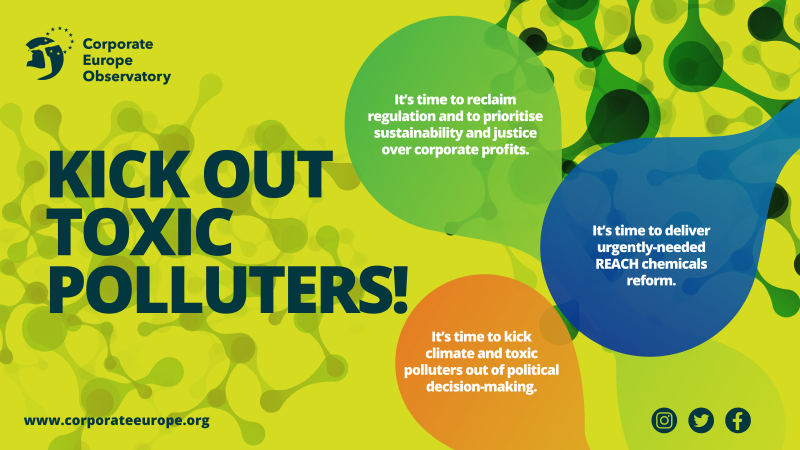
BASF is a company with a history of nearly 160 years of operation. In this profile we have dwelt on the recent rather than past nature of its operations, but there is one historical aspect that we cannot ignore. BASF was one of the companies divested from IG Farben after it was broken up in the wake of the Nuremberg trials. It is shocking to us that BASF’s website today continues to cast doubt on whether the leaders of IG Farben would have known that its subsidiary’s Zyklon B toxic gas was being used to kill millions inside the Nazi death chambers. The company ran a vast slave labour factory called IG Auschwitz near the concentration camp, to make the chemicals. The German industry compensation fund for victims of the Holocaust, to which BASF has contributed €70 million, was set up in 2000, 55 years after the end of World War II.
This provides worrying context when we explore the extent to which BASF’s corporate culture accepts full accountability for its past and present toxic legacy.
For despite the slick communications, the well-connected Chief Executive, the commissioned philharmonic symphony, and the in-house sommelier, BASF is a company with a deeply problematic record, which has too often found itself on the wrong side of history. There is the known environmental pollution, but also the as yet unknown toxic legacy of its persistent and hazardous products that will only become fully clear in the years to come. There is the enormous carbon footprint and investments in, and lobbying for, fossil fuels. There is the record on tax avoidance, and its demands on the public purse for financial support for its operations. And there is the doom-mongering about promised and much needed reforms of EU chemical regulations.
For too long politicians in Berlin and in Brussels have drunk the BASF kool-aid. It seems that they have allowed its economic power within Germany’s export-led growth model to translate into political power, enabling access, connections, and wider influencing to deliver too much of its lobby agenda. BASF and its corporate and political allies are holding our health and our environment to ransom.
It’s time to tackle this big polluter and its oversized political power. It’s time to reclaim regulation – on fossil fuels, on chemicals and pesticides, on genetic engineering, on tax avoidance – and to prioritise sustainability and justice over corporate power. At the EU level, the von der Leyen Commission could start with re-prioritising the REACH revision and ensuring the proposal is published before the summer.
And last but not least, it’s time to kick climate and toxic polluters out of political decision-making.
All lobby data in this article was checked on the registers on 9 March 2023.
